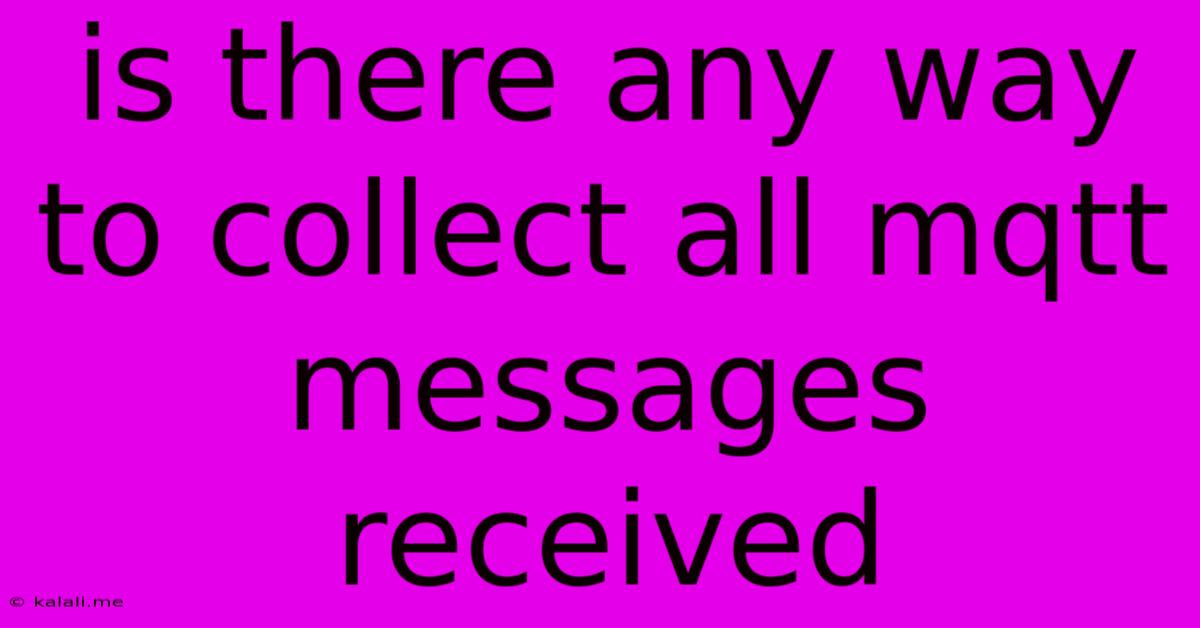Is There Any Way To Collect All Mqtt Messages Received
Kalali
Jun 06, 2025 · 3 min read

Table of Contents
Is There Any Way to Collect All MQTT Messages Received?
Collecting all MQTT messages received depends heavily on your specific needs and setup. There isn't a single, universally applicable solution, but several approaches can effectively capture and store this data. This article explores various methods, highlighting their strengths and weaknesses to help you choose the best approach for your application. This will cover various aspects including logging, dedicated brokers, and using external databases.
Why Collect MQTT Messages?
Before diving into the methods, understanding why you need to collect all MQTT messages is crucial. Common reasons include:
- Debugging and Troubleshooting: Identifying errors or unexpected behavior within your MQTT system.
- Monitoring and Performance Analysis: Tracking message rates, latency, and potential bottlenecks.
- Data Analysis and Reporting: Extracting valuable insights from the data stream for business intelligence or research purposes.
- Auditing and Compliance: Maintaining a record of all message exchanges for regulatory compliance.
- Machine Learning and Predictive Analytics: Using historical message data to train machine learning models for prediction and optimization.
Methods for Collecting MQTT Messages:
Several methods can be used to collect all MQTT messages:
1. Broker Logging:
Most MQTT brokers offer built-in logging capabilities. These logs often record basic information like timestamps, topic names, and message payloads. However, these logs might not be sufficient for complex analysis or large-scale deployments. The level of detail captured varies depending on the broker and its configuration. Examining your broker's documentation is crucial here. Some brokers allow for customizing log formats and levels of detail. This is a good starting point, especially for simpler applications.
2. MQTT Client with Logging:
You can extend your MQTT client application to include logging functionality. This gives you fine-grained control over the data you collect and the format in which it's stored. This approach involves writing custom code within your client to record incoming messages to a file or database. This provides flexibility but requires more development effort. Consider using libraries and frameworks to simplify the process; Python's paho-mqtt library is a popular choice, enabling logging with minimal overhead.
3. Message Broker with Persistence:
Some MQTT brokers support message persistence, meaning messages are stored even if the broker restarts. This ensures that no messages are lost, even during outages. This is often configured within the broker's settings. However, be mindful of the storage capacity and performance implications of storing large volumes of data.
4. External Database:
Integrating your MQTT setup with an external database (like MongoDB, PostgreSQL, or InfluxDB) provides robust, scalable, and structured storage. A dedicated MQTT client can subscribe to relevant topics, process the messages, and store them in the database. This approach is ideal for large-scale applications requiring advanced querying and analysis capabilities. You might need to develop custom code or use existing libraries to handle the data transfer and storage.
5. Using a dedicated MQTT message collector:
Several dedicated tools are designed specifically to capture and manage MQTT messages. These tools often provide features like filtering, data visualization, and export capabilities. Researching available solutions is worthwhile, but remember to carefully consider licensing and cost implications.
Choosing the Right Method:
The best method depends on factors like:
- Scale of your application: For small-scale applications, broker logging or client-side logging may suffice. For large-scale deployments, a database solution is generally preferable.
- Data volume: High message volumes might necessitate specialized database solutions or optimized storage techniques.
- Required data analysis: If you need advanced analysis, an external database with querying capabilities is a must.
- Development resources: The complexity of implementing each method varies significantly.
Remember to always consider security implications when storing MQTT messages. Implement appropriate security measures to protect sensitive data. Carefully choose the storage location and ensure access control mechanisms are in place. By carefully considering your needs and the available options, you can reliably collect and manage the flow of MQTT messages in your system.
Latest Posts
Latest Posts
-
Car Wont Start One Click Then Nothing
Jun 07, 2025
-
Him Domt Know Where Him Is
Jun 07, 2025
-
Get Your First Image In Knowledge Panel
Jun 07, 2025
-
Has Jennifer Aniston Ever Gone Nude
Jun 07, 2025
-
Who Was On The Cross With Jesus
Jun 07, 2025
Related Post
Thank you for visiting our website which covers about Is There Any Way To Collect All Mqtt Messages Received . We hope the information provided has been useful to you. Feel free to contact us if you have any questions or need further assistance. See you next time and don't miss to bookmark.